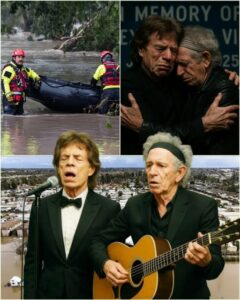On the night of July 11, 2025, as the world absorbed the heartbreaking news of the catastrophic floods in Texas, John Foster’s phone rang. On the other end was Paul МсСаrtnеу – not the global icon, not the former Beatle – but a man, a human voice shaped by loss, compassion, and the quiet wisdom that comes from living through life’s deepest sorrows.
“We don’t need a perfect hit,” Paul said gently. “What we need is presence. A song that can hold people in their grief.”

It was not a statement from a polished press release. It was a truth spoken from the soul.
The very next morning, they met in a modest studio tucked away in Poteet, Texas. There were по producers, по саmeras, no entourage. Just two guitars, two voices, and the shared understanding that music could be more than entertainment could be a place to grieve, to remember, to breathe. – it
The song they wrote and recorded that morning, “Light Beyond the Water,” was never meant to top charts. It wasn’t made to trend or go viral. It was created quietly, from mourning – as a gentle offering to those standing in the aftermath of unthinkable loss.
When John Foster first read through the names of the flood’s victims 111 people, including nearly 30 children – he broke down. Sobbing uncontrollably, he couldn’t continue. Paul McCartney sat next to him, reached across the table, placed a hand on his, and softly said:
“Let’s sing as if they can still hear us.”
No fanfare followed. No headlines. No interviews. Just a simple video uploaded αποπymously online: two men standing in a candlelit church, framed by stained glass and silence. Paul McCartney eyes closed, voice raw and deep sang each note as if drawing it from the depths of memory. John Foster, voice trembling but unwavering, sang each word like a prayer carried by the wind.
As their harmonies intertwined, the screen gently faded to black, revealing one solemn line:
“In Memory of the Texas Flood Victims – July 2025”
There was по need for explanation. In that moment, music became more than melody. It became meaning. It became sanctuary.
This is who Paul McCartney has always been, beneath the global fame and timeless songs. A man who understands the quiet power of showing up. He didn’t have to be there. He didn’t have to lend his voice, his time, or his presence. But he did because to him, music is not about spotlight. It’s about soul.
For decades, Paul has stood for more than music. He’s sung for peace. He’s marched for change. He’s fought for animals, for children, for the planet. But most of all, he has never forgotten the people the millions who turn to his music in joy, in heartbreak, and in everything in between.
He doesn’t speak loudly, but his actions echo. In moments of crisis, he doesn’t just offer a quote – he offers himself. And in this moment, as Texas mourned its dead, he gave the one thing only an artist like him could: a song not for charts, but for healing.
“Light Beyond the Water” isn’t something you play at parties. It’s a song for quiet rooms. For long drives with tears in your eyes. For late nights when grief settles in like fog, and all you need is to know someone else remembers too.
Paul McCartney didn’t write it to be remembered. He wrote it to help others remember – the lives lost, the families left behind, the children who should have had more time. And in doing so, he reminded us of the deeper role of music in our lives.
At 83, Paul doesn’t need to prove anything. His place in history is secured. But moments like this show why he remains not just relevant, but necessary. He reminds us that art, at its best, is not about ego – it’s about empathy.
And so in the stillness of that church, beneath the flickering candles and stained glass, two voices rose. One of them belonged to a Beatle. The other, to a grieving friend. Together, they made something sacred – not just a song, but a space. A space where pain could rest. Where love could echo. Where memory could live.
Paul McCartney didn’t just sing for Texas.
He sang with it.
And in doing so, he gave the world something to hold on to.